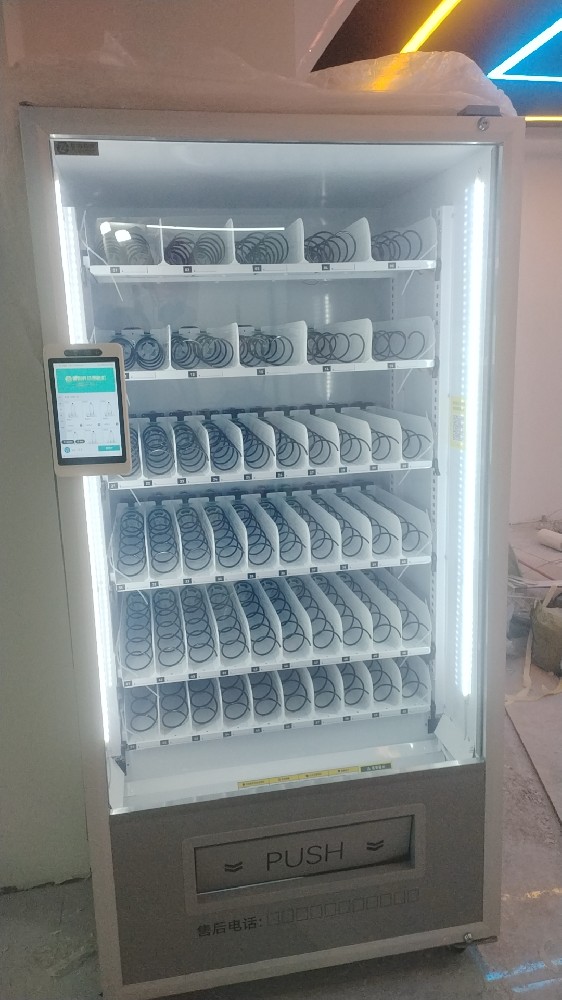Against the backdrop of the ever-changing retail industry today, vending machines have rapidly emerged with their advantages of convenience, efficiency, and no time constraints, forming a complex situation of both competition and integration with traditional retail with a long history and profound heritage. The collision and integration between them are quietly reshaping the entire retail market, bringing consumers a brand new shopping experience and opening up more possibilities for industry development.
1、 The collision between vending machines and traditional retail
(1) Competition for consumer scenarios
Traditional retail mainly relies on physical stores, such as convenience stores, supermarkets, grocery stores, etc., distributed in streets, neighborhoods, commercial centers and other places, providing consumers with relatively fixed and spacious shopping spaces, where people can freely browse and select goods in the store. However, vending machines, with their compact and flexible features, can penetrate into more scenarios that traditional retail cannot reach, such as between floors of office buildings, factory workshops, school teaching buildings, park corners, etc. These places have a large flow of people but limited space, and vending machines have just filled the gap in people's instant consumption, seizing some potential consumption scenarios that may have belonged to traditional retail, resulting in a clear collision between the two in terms of coverage of consumption scenarios.
(2) Competition for customer traffic
The shopping time and total consumption demand of consumers are relatively fixed to a certain extent, and both vending machines and traditional retail are striving to attract more customers and gain a larger market share. Traditional retail attracts consumers who have more time and need comprehensive shopping due to its rich variety of products, professional guidance services, and comfortable shopping environment; And vending machines, with their characteristics of immediacy, no need to wait in line, and convenient operation, have attracted customers who pursue fast shopping and meet current temporary needs, especially in fast-paced life scenarios. Many customers who may have entered convenience stores have chosen more time-saving vending machines, which undoubtedly intensifies the competition between the two in terms of customer traffic.
(3) Differences and conflicts in operating models
Traditional retail typically requires hiring a large number of employees, involving multiple complex processes such as store leasing, personnel management, product display, and inventory counting. Operating costs are relatively high, but it can also provide more humane and meticulous services. The operation of vending machines, on the other hand, focuses more on the maintenance, remote monitoring, and replenishment management of machinery and equipment. The labor cost is relatively low, but a large amount of capital needs to be invested in purchasing equipment and conducting site deployment in the early stage. The differences in this operating model have led to different considerations and response strategies between the two in the face of market changes, cost control, and service optimization, which have also caused collisions and competition to a certain extent.
2、 The integration of vending machines and traditional retail
(1) Integration at the level of commodity supply
Many traditional retailers have realized the potential of vending machines and are starting to use them as a way to expand their sales channels, extending their products to vending machines for sale. For example, large chain supermarkets will place vending machines in surrounding communities, office buildings, and other places to sell some of the best-selling products in the supermarket, such as beverages, snacks, daily necessities, etc., using the convenience of vending machines to increase the exposure and sales opportunities of products, and achieve the synergy of online and offline product supply. At the same time, some vending machine operators also establish close cooperative relationships with traditional suppliers, leveraging the mature supply chain system of traditional retail to ensure the quality, variety, and timely replenishment of goods. Both parties complement each other in product supply and jointly expand the market.
(2) Integration of Service Experience
Traditional retail focuses on providing customers with high-quality face-to-face services, with professional salespeople answering questions and providing advice, creating a friendly and comfortable shopping atmosphere. Vending machines are constantly integrating intelligent services, such as providing personalized recommendations to customers through big data analysis, setting up interactive games to increase shopping fun, and so on. Nowadays, these two service experiences are gradually integrating. Some traditional convenience stores have set up self-service vending areas in their stores, allowing customers to choose products for quick settlement and experience the convenience of vending machines; And some vending machines have also begun to be equipped with customer service hotlines or online customer service functions. When customers encounter problems, they can receive timely manual assistance, learn from the service advantages of traditional retail, and improve the overall shopping experience.
(3) Integration of data resources
In the digital age, data has become an important asset for enterprise operations. Traditional retail has accumulated a large amount of offline data on customer purchasing behavior, consumption preferences, and product sales, while vending machines have also collected rich data combining online and offline operations, such as purchase time periods and payment method preferences in different scenarios. By integrating these data resources, retailers can create more comprehensive and accurate user profiles, gain a deeper understanding of consumer demand characteristics, and make more scientific decisions in product selection, pricing, marketing activity planning, and other aspects, achieving precision marketing. Both traditional retail stores and vending machines can benefit from this, improving operational efficiency and sales performance.
(4) Scene expansion and collaborative development
Vending machines and traditional retail are constantly exploring new models for scene expansion and collaborative development. For example, in large commercial complexes, there are traditional retail stores such as supermarkets and specialty stores that meet consumers' comprehensive and in-depth shopping needs, as well as multiple vending machines that are reasonably arranged and distributed on various floors, corridors, and other locations of the mall, making it convenient for consumers to meet their immediate needs for food, rest, and other necessities while shopping. The two work together to create a complete, convenient, and rich shopping environment, enhancing the attractiveness and competitiveness of the entire commercial complex and achieving coordinated development.
3、 Future prospects
The collision and integration of vending machines and traditional retail is an inevitable trend in the development of the retail industry. With the continuous advancement of technology, the two are expected to further break boundaries and achieve deeper integration. In the future, we may see more traditional retail giants expanding their business territory through vending machines and extending their brand influence to a wider range of fields; And vending machine operators may also learn from the management experience of traditional retail to improve service quality and operational level.
Meanwhile, consumers will continue to benefit from the more convenient, personalized, and diversified shopping experience brought about by this integration. Whether in bustling cities or remote rural areas, day or night, one can enjoy the convenience brought by the continuous innovation of the retail industry, meeting various consumer needs. In short, the collision and integration of vending machines and traditional retail are writing a new chapter in the retail industry, and we can wait and see if they create more brilliance in the future.
Do you prefer vending machines or traditional retail in your daily shopping? Welcome to share and exchange in the comment section!



